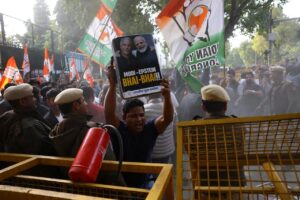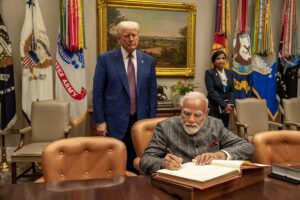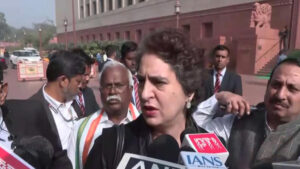Trump/Harris: Who’s The Better Bet For India?

Large cut-outs of former US President Donald J. Trump and Indian Prime Minister Narendra Modi erected for the “Namaste Trump” event in Ahmedabad, India, in 2020 (Official White House Photo by Andrea Hanks Public Domian 1.0 Universal)
India’s External Affairs Minister S. Jaishankar recently said “we have every confidence that we will be able to work with the President of the United States, whoever he or she will be”.
While the Indian establishment will be able to work with either Kamala Harris or Donald Trump as president, it may prefer one over the other.
The latest opinion polls show Harris currently has the edge. However, it would be premature to rule out a Trump victory.
Narendra Modi’s government has done business with Trump in the past. While Harris has Indian roots — her mother was from Chennai — she is perceived as a progressive, a political type that the Delhi establishment views with suspicion.
Furthermore, her nomination acceptance speech at the Democratic convention suggests a broad continuity with Biden’s foreign policy.
She spoke of America’s “global leadership” and cast international politics as an “enduring struggle between democracy and tyranny”. But the specifics of her India policy are hard to anticipate, especially because her campaign has been light on policy details.
Natural preference
Some areas of comfort between Trump and the Bharatiya Janata Party (BJP)-led Delhi establishment make it appear that Trump would be the natural preference.
First, both sides are conservatives.
As the speeches of influential Hindu nationalist intellectuals at the National Conservatism conference in Washington DC last month show, they share with their American counterparts an ideology based on God, religion, family, tradition, patriotism and nationalism.
The BJP and Rashtriya Swayamsevak Sangh leader Ram Madhav boasted of having defeated the “left, liberal, Marxist, radical, Islamist cabal” in India. Trump identifies his political opponents as communists and radical left.
How this shared sense of values and rivals will translate into policy chemistry is hard to anticipate, but it cannot be dismissed. As any student of modern ideology knows, conservatives converge while radicals diverge.
Furthermore, both Trump and Modi view themselves as strong, decisive leaders mandated to bring about historical changes within their nations.
Trump has often expressed his admiration for “strong”’ leaders, claiming he prefers to work with them. Although Modi has not expressed any preference for leaders or leadership styles in foreign policy, he is not uncomfortable dealing with the type that Trump stands for or inclines towards.
To the personality dimension could be added the experience of working together between 2017 and 2020, the highlights included the “Howdy, Modi!” event in the US and the “Namaste Trump” event in India.
There is more continuity than change in the composition of the Indian team that dealt with the first Trump administration, and they would hope that Trump will pick up where he left off in 2020.
Trump is often associated with viewing foreign policy as a give-and-take business rather than an instrument of securing not just national interest but also promoting democracy and human rights.
India’s foreign policy is not unaffected by transactionalism. While commentators have found India’s policy towards the West to be transactional, it is New Delhi’s relations with Moscow that are best characterised by that term.
Then there is geopolitics.
Russia and Ukraine
Modi’s visit to Russia and his hug with Vladimir Putin did not go down well with the Biden administration.
Trump’s approach to the Russia-Ukraine war will therefore have a bearing on US relations with India. Trump has not specified precisely what he would do to end the war but has repeated multiple times that he would halt it immediately if he is re-elected.
Whatever he attempts, an easing of Western pressure on Russia will be a boost for New Delhi’s attempts to prevent Russia from becoming too close to China. It would also reduce friction in India’s relations with the West.
However, despite the presence of these areas of comfort, Trump’s foreign policy instincts could make the Delhi establishment wary of his presidency.
America’s global leadership has been pivotal to the rise in India’s stature and international influence in the past quarter century. Helping India become “a major world power in the 21st century” was articulated as American policy at one time.
Trump, however, appears indifferent to the notion of America’s global leadership.
Ample evidence of this came during his first term when he withdrew the US from several major international commitments and multilateral organisations.
His is an external policy of economic protectionism and political isolationism. If elected, Trump will likely and — because it would be his legacy term — decisively scale down America’s security responsibilities, exposing Europe and America’s Indo-Pacific partners and allies to security threats from China, Russia and, in the case of the Koreas, each other.
Although it was Trump who led the Quad’s revival in 2017, his first term and the spectre of his return in the past year have caused concerns across Japan, Australia, South Korea and Taiwan.
In Europe, the idea of security self-reliance has taken root, which augurs well for the continent in the long run but does not address its immediate and medium-term security challenges. The only external security burden a Trump foreign policy will bear is that of Israel. Everyone else is potentially dispensable.
Trump’s foreign policy could potentially destabilise the international system across Europe, Asia and the Indo-Pacific. Like other middle powers who seek stability in global geopolitics, India too would prefer less headwinds.
The Modi-led coalition government has set the target of turning India into a “developed” nation by 2047, the 100th year of its independence. This entails a large-scale transformation of India’s economic and social profile. It requires a reformed but capitalist economic order, whose prospects may be marred by Trump’s economic policy.
If he can take away what he claims are China’s unfair advantages in bilateral trade, Trump would have delivered a serious blow to capitalism. The US would also have less incentive to stay strongly committed to balancing China’s regional influence in Asia.
The change these developments would produce in regional geopolitics would not be catastrophic, but it would be enough to further strengthen China’s already powerful hand in India’s immediate and extended neighbourhoods.
Harris’s position on the specifics of foreign policy may not be well-known but she will bring continuity to the macro patterns of American foreign policy. The Delhi establishment may well prefer that continuity over a conservative, familiar but disruptive Trump.
(Published under Creative Commons from 360info. Read the original article here)





